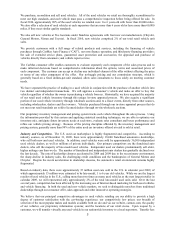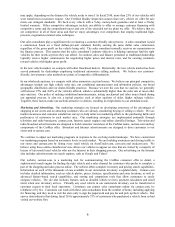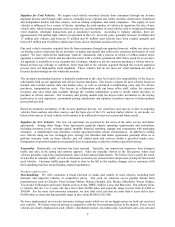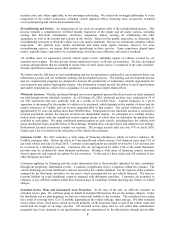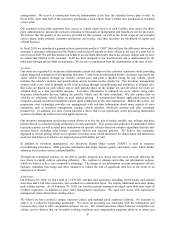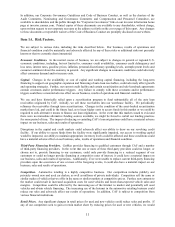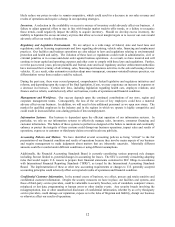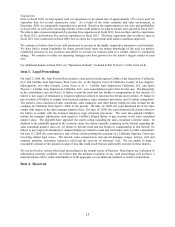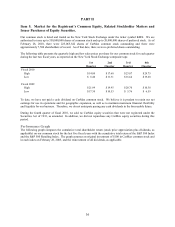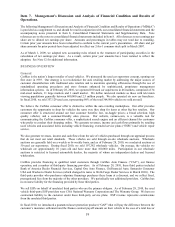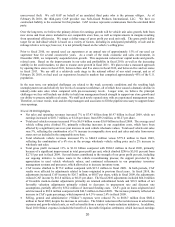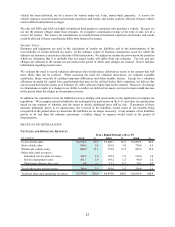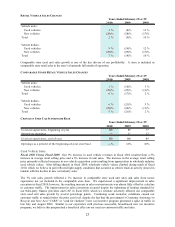CarMax 2010 Annual Report Download - page 25
Download and view the complete annual report
Please find page 25 of the 2010 CarMax annual report below. You can navigate through the pages in the report by either clicking on the pages listed below, or by using the keyword search tool below to find specific information within the annual report.15
Expansion
Prior to fiscal 2010, we had opened used car superstores at an annual rate of approximately 15% of our used car
superstore base for several consecutive years. As a result of the weak economic and sales environment, in
December 2008, we temporarily suspended store growth. Based on the improvements in our sales and profitability
in fiscal 2010, as well as the increasing stability in the credit markets, we plan to resume store growth in fiscal 2011.
We plan to take a measured approach by opening three superstores in fiscal 2011, between three and five superstores
in fiscal 2012, and between five and ten superstores in fiscal 2013. The three superstores that we plan to open in
fiscal 2011 were constructed in fiscal 2009, but we chose not to open them until market conditions improved.
We continue to believe that we are well positioned to succeed in the highly competitive automotive retail industry.
We have built a strong foundation for future growth based upon our unique knowledge of the used car market,
established presence in key locations and ability to execute our business plan in a market subject to continuous
change. We continue to refine our operating strategies and have grown to be the nation’s largest retailer of used
cars.
For additional details on fiscal 2010, see “Operations Outlook,” included in Part II, Item 7, of this Form 10-K.
Item 3. Legal Proceedings.
On April 2, 2008, Mr. John Fowler filed a putative class action lawsuit against CarMax Auto Superstores California,
LLC and CarMax Auto Superstores West Coast, Inc. in the Superior Court of California, County of Los Angeles.
Subsequently, two other lawsuits, Leena Areso et al. v. CarMax Auto Superstores California, LLC and Justin
Weaver v. CarMax Auto Superstores California, LLC, were consolidated as part of the Fowler case. The allegations
in the consolidated case involved: (1) failure to provide meal and rest breaks or compensation in lieu thereof; (2)
failure to pay wages of terminated or resigned employees related to meal and rest breaks and overtime; (3) failure to
pay overtime; (4) failure to comply with itemized employee wage statement provisions; and (5) unfair competition.
The putative class consisted of sales consultants, sales managers, and other hourly employees who worked for the
company in California from April 2, 2004, to the present. On May 12, 2009, the court dismissed all of the class
claims with respect to the sales manager putative class. On June 16, 2009, the court dismissed all claims related to
the failure to comply with the itemized employee wage statement provisions. The court also granted CarMax's
motion for summary adjudication with regard to CarMax's alleged failure to pay overtime to the sales consultant
putative class. The plaintiffs have appealed the court's ruling regarding the sales consultant overtime claim. In
addition to the plaintiffs' appeal of the overtime claim, the claims currently remaining in the lawsuit regarding the
sales consultant putative class are: (1) failure to provide meal and rest breaks or compensation in lieu thereof; (2)
failure to pay wages of terminated or resigned employees related to meal and rest breaks; and (3) unfair competition.
On June 16, 2009, the court entered a stay of these claims pending the outcome of a California Supreme Court case
involving related legal issues. The lawsuit seeks compensatory and special damages, wages, interest, civil and
statutory penalties, restitution, injunctive relief and the recovery of attorneys’ fees. We are unable to make a
reasonable estimate of the amount or range of loss that could result from an unfavorable outcome in these matters.
We are involved in various other legal proceedings in the normal course of business. Based upon our evaluation of
information currently available, we believe that the ultimate resolution of any such proceedings will not have a
material adverse effect, either individually or in the aggregate, on our financial condition or results of operations.
Item 4. Reserved.


